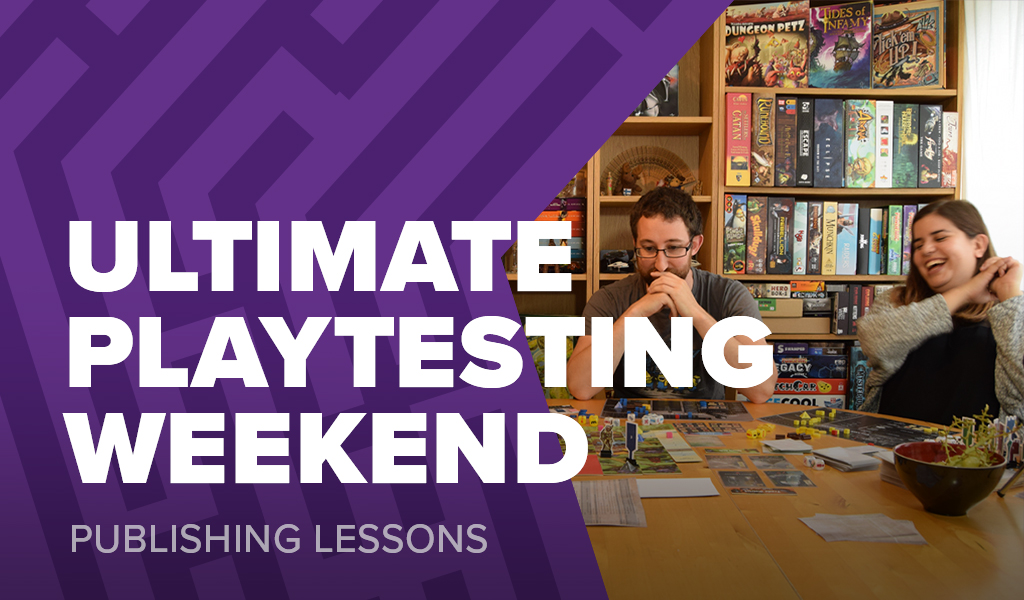The ultimate playtesting weekend

When designing a complex game, traditional playtesting methods might not always provide the insights you need. Recently, I organised an intensive playtesting event to focus on my newest game’s flow, learning curve, and overall player experience. Here’s how it went and why I would recommend this approach to others.
Why this approach?
If you want to test with a large number of people, typical in-person testing can be slow with maybe only one test in an evening. Remote testing can be faster but limits feedback to what testers record.
Project Leaf is a bigger game than some of my recent releases, and it’s incredibly important to me that the learning curve is as well thought out as possible. I needed to ensure it was accessible and engaging, even for those unfamiliar with such games. Observing real-time reactions and behaviours provided invaluable insights that remote feedback couldn’t match.
The setup
To achieve this, I partnered with AireCon, a UK convention, and hired a private room for a series of controlled playtests. This allowed for uninterrupted observation and ensured the game’s confidentiality, as nothing about the game is currently public. I asked people to sign up in advance with no knowledge of the game and simply gave them the amount of time it would take to play, ensuring unbiased, fresh perspectives.
The event
Over three days, I conducted 24 two-and-a-half-hour playtest sessions, enough time for introductions, teaching, playing, and feedback on the game. The introductions were done in a different room to playing the game so I could set expectations of what we were going to do, and then take them into the game room and observe everything from their initial reactions onwards. I wanted to see the first component someone would touch, which they would naturally comment on, and which went unnoticed. Key observations included:
- Initial reactions to game components.
- Questions asked during the teach.
- Questions asked during gameplay.
- How long it took people to feel comfortable with the rules.
- Moments of confusion or hesitation.
- Strategies adopted by players.
- Parts of the game most interacted with and least interacted with.
- Areas of the game that caused discussion and/or emotional responses.
For me, discussion and emotional responses caused by a game are key to it providing a great experience, and they are easiest to measure when observing.
With the game finished, I asked players to go to another room and anonymously fill in a feedback questionnaire. I left them alone so they could provide honest feedback without concern I would know who wrote what.
From the player feedback, I gathered the game was finished and ready to release. The players generally had a really good time and the ratings were much better than I had anticipated.
However, from my own observations of watching 100 strangers play the game, there were parts of the game experience that felt like they could be more streamlined. There were moments which no one mentioned, but left me questioning if they could be better. I spent several months refining the game based on my observations and I am now very happy with how the game is playing.
Conclusion
This playtesting marathon was exhausting but incredibly rewarding. It highlighted areas for improvement which would have been missed without being there in person and validated the game as a whole. I encourage other game designers to consider running similar testing events when their games are nearly complete to really understand how the experience of the game is received.
In-person testing with a large group in a short period offers a depth of feedback on the game’s user experience that is hard to achieve otherwise.
Recommendations
For those looking to replicate this method:
- Partner with local conventions or game clubs to secure a private testing space.
- Prepare multiple prototypes and bring a friend who can help reset one copy of the game while you start teaching on another to reduce downtime.
- Practise teaching your game.
- Focus on observing rather than intervening during playtests.
- Use anonymous surveys to collect honest feedback.
This approach, while demanding, can really enhance the experience of playing your game, helping to ensure it is both accessible and enjoyable. And as a bonus, it’s a great way to perfect your teaching of the game!
Frank West
Frank West is a gamer and designer based in Bristol, UK. He published his first board game, The City of Kings, in 2018 and now works on other games and organising events in the local area. His goal? To design and publish games focusing on immersive themes, fun mechanics and beautiful components. If you have any questions or would just like a chat, feel free to get in touch at any time!


4 comments
Wonmin Lee
28th June 2024 at 7:07 pm
24 sessions of 2.5 hrs = 60 hrs, which only left you with 12 hrs to sleep across 3 days!?!? That’s crazy!! Hope you are doing well Frank.
Frank West
28th June 2024 at 8:08 pm
It was certainly a very intense few days but I wanted to make the absolute most of it, perhaps next time I’d do one less session per day. It was always nice when a group finished a little early!
Andrew Rogan
24th July 2024 at 1:53 pm
As one of those playtesters, I can say for certain, I can’t wait for more info on the game, it was a pure delight from start to finish, simple to pick up and learn, with lots of strategy that you miss on the first play
Frank West
24th July 2024 at 4:29 pm
I really appreciate you volunteering your time to playtest, and I’m glad the game has left some positive memories. The game has come a long way since the playtests and I am really excited to share all the information soon!